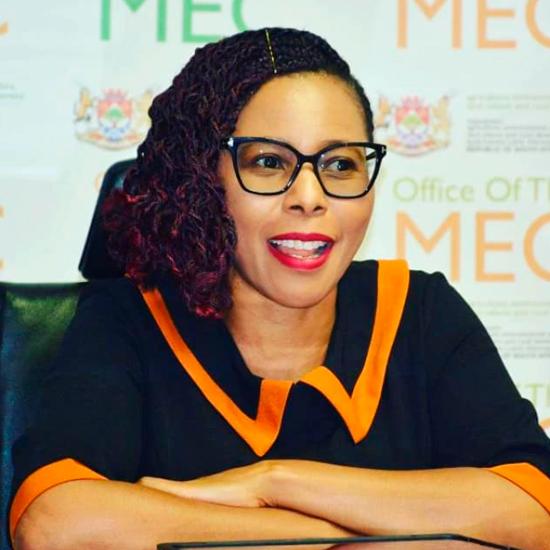Manopole’s vision for
a transformed Northern Cape

When Northern Cape Agriculture, Environmental Affairs, Rural Development and Land Reform MEC Mase Manopole speaks about her work, her passion for empowerment stands out. Her vision is clear – to leave behind a legacy defined by transformation, inclusion and sustainable development.
Central to this vision is her dedication to placing women, youth and previously disadvantaged communities at the forefront of agricultural and environmental progress in the province.
In a recent interview with Public Sector Manager magazine, Manopole reflected on her department’s achievements, challenges and aspirations. “In 2023/24, our department achieved 77% of its planned annual targets,” she said. “In the main, it is because of the partnerships and collaborations we have with NGOs [non-governmental organisations] that assisted us. Our budget constraints pose challenges, but we have to look for and find strategic partners to ensure that we achieve our objectives”.
Despite limited resources, she credits her department’s success to the dedication of its officials. “We have committed officials who are devoted to the cause, and that enables us to reach our goals,” she explained.
Good governance
The MEC understands that good governance begins with sound financial management. “We have developed audit action plans to ensure that we are prudent in how we manage funds,” she explained. “In areas where we see wastage, we are developing strategies to mitigate it. We are also looking at recruiting qualified and specialised officials to assist us”.
She noted that for the past few financial years, there have been several funded vacancies in financial management that the department has been unable to fill due to a provincial moratorium. “We have requested the Premier to lift the moratorium because our department has been identified for success in Operation Clean Audit,” she said.
Given the Northern Cape’s vast in size and sparse population, Manopole acknowledges the unique challenges that come with the province’s allocation under the Division of Revenue Act of 2025. However, she remains optimistic, explaining that they have identified opportunities that will sustain their services.
Equal distribution of resources
Agriculture currently contributes around 7% to the Northern Cape economy, but Manopole’s target is to raise that figure to 10% over the medium term. “To achieve that, agro-processing will be key. We want to drive transformation in this space,” she emphasised. “We plan to support at least 10 women entrepreneurs to move into the commercial agro-processing sector”.
Transformation is also a major focus in the conservation and biodiversity sector. “We have to transform the sector,” Manopole said. “We have approved the Game Donation Policy, and in the last financial year, we implemented its first phase. We are currently screening and assessing the farms that applied. We want previously disadvantaged communities to benefit from the wildlife economy”.
“The Northern Cape LandCare program is a community-based initiative supported by the provincial government to promote sustainable agricultural land resource management through activities like SoilCare, WaterCare, VeldCare, and JuniorCare. Its goal is to optimize the productivity and sustainability of natural resources to improve food security, job creation, and the quality of life in the province”.
A province rich in natural resources
The province’s environmental and coastal potential is also key part of her vision. “Not many people are aware that we have a coastline; that we have a beach in the Northern Cape,” she remarked with a smile. She highlighted the planned development of green hydrogen in the region, along with the construction of a new port at Boegoebaai. She also explained that they were supporting the provincial Department of Economic Development by ensuring that progress was aligned with environmental preservation.
Referring to the Northern Cape as “the new growth frontier of our country,” Manopole expressed confidence that the province’s largely untapped resources will eventually allow it to “stand tall” as a driving force for national development.
Viticulture and tourism
Among the opportunities that excite the MEC most are those in viticulture and tourism. “We have water rights covering about 750 hectares that have not been developed. We want to encourage young people and women to get involved in this sector,” she said.
“Developing vineyards in these areas can help unlock new growth for our rural communities.” Manopole also envisions the province becoming a leading eco-tourism destination. “We have unique flora and fauna, and our landscapes are breathtaking,” she said. “We must protect our succulent plants and reptiles from poaching and promote the Northern Cape as a place to experience biodiversity and natural beauty”.
Job creation
In July, Manopole tabled Budget Vote 12 – a R735 million investment in the future of agriculture, environment and rural development. The 2025/26 commitments include the creation of 750 new job opportunities and 210 environmental job opportunities; support for 1 300 subsistence producers through food security initiatives; R8.875 million allocated to eight LandCare projects creating 50 Expanded Public Works Programme opportunities; over R205 million directed to empowering women and youth through the Comprehensive Agricultural Support Programme and Ilima/Letsema; and the launch of a Digital Extension Support System for smallholder farmers.
“This Budget is an instrument of transformation,” she said during her Budget Vote. “It is a call to action for inclusive growth, smart farming, resilient ecosystems and a more equitable rural economy.”
For Manopole, the road ahead is about more than meeting targets; it is about changing lives. “I want to see a Northern Cape where no young person feels excluded from the agricultural economy,” she said. “A province where women lead farms, manage processing facilities, and own the land they work on. That is the legacy I want to leave.”


